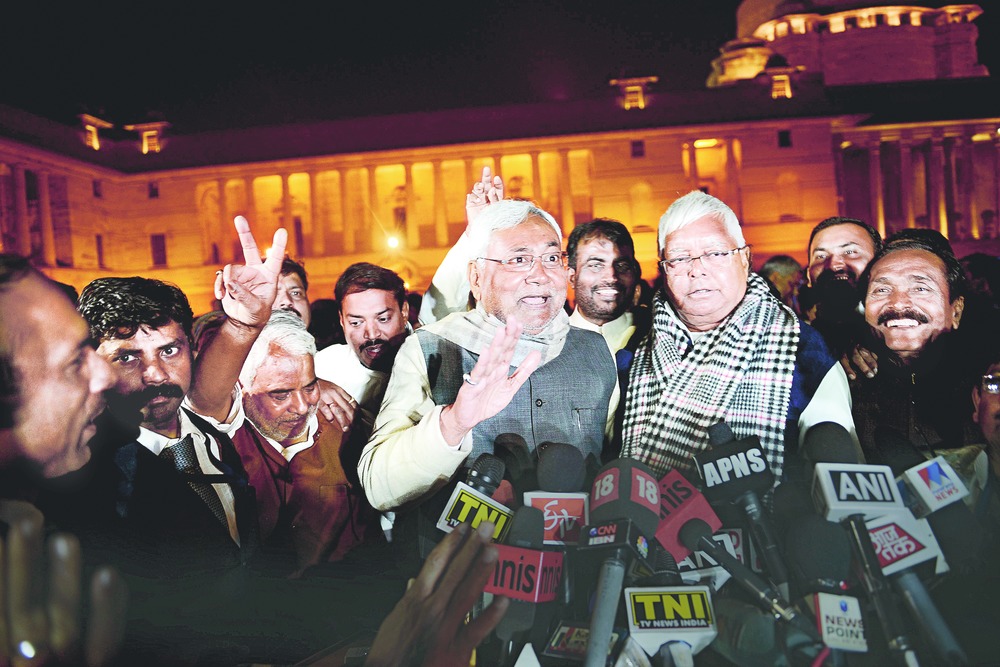
Mohammad Hasim admires Nitish Kumar, but does not think that the twice-elected Bihar chief minister will be allowed to pull off a hat trick. "Nitish has done so much for Bihar but he has made a big mistake by joining hands with Lalu," the Patna resident says, referring to the former chief minister Lalu Prasad. "Many are now reluctant to vote for him."
And he explains why.
Though he was a young lad during Lalu's reign, he recalls how "thugs ruled the streets" and children were kidnapped from villages. "Few want the return of the Lalu raj in Bihar," he argues.
Hasim believes that the Rashtriya Janata Dal (RJD) boss - once Nitish Kumar's arch enemy and now his poll partner - did nothing for Bihar during the RJD's 15-year rule, now famously described as "jungle raj".
Indeed, as the Bihar elections draw near, a "Lalu scare" seems to be fast gripping the state, once derided as "the Republic of Bihar" for its lawlessness.
From Patna to Bhojpur, from Muzaffarpur to East Champaran, the refrain is the same - that Nitish Kumar's Janata Dal (United), or JDU, would have fared better if it had fought the Assembly elections on its own - a claim not entirely borne out by facts.
But, then, perceptions matter in politics - more so in election time.

Needless to say, the Bharatiya Janata Party (BJP), for its part, is stoking up the fear, harping on Lalu's so-called misrule that lingers in public memory as well as the old divide between Lalu and Nitish.
BJP prachar raths - souped-up vehicles with giant video screens - are crisscrossing the state, showing video clips of Nitish Kumar railing against Lalu Prasad for misgovernance.
Nitish and Lalu - friends-turned-foes-turned-allies - are contesting 101 seats each, along with the Congress, in a bid to contain the BJP, Nitish's ally in the 2005 and 2010 elections in Bihar.
The polls for 243 constituencies will take place in five phases between October 12 and November 5, with the counting slated for November 8.
Resentment against Lalu - who installed his wife, Rabri Devi, as the chief minister when a corruption case against him gathered steam - is palpable across the state.
"We want Nitish Kumar back but not Lalu Prasad," stresses Debashis Mukherjee, a homeopathy physician in Motihari, the headquarters of East Champaran district which has 12 Assembly constituencies.
He recalls those days when he would shut his clinic by 7pm because few patients dared step out in the dark during Lalu and Rabri Devi's regime from 1990 to 2005.

Things were no better for his brother, Debapriyo, who owns a sari store in the congested Motihari Bazaar.
"Bombs were hurled in broad daylight and extortion was rampant when the RJD ruled Bihar," says the Rotarian who once thwarted an attempt to extort Rs 1 lakh from him by a goon close to a local RJD leader.
But with the police cracking down on criminals, peace has reigned in Bihar for the better part of Nitish's 10-year rule.
Today, the Mukherjee brothers keep their clinic and shop open till late in the evening. No wonder, they say, their incomes have gone up.
"Who had ever thought that we would sleep in air-conditioned rooms in Motihari," Debashis exults. "When Lalu was in power, there was no power at night."
Along with the power situation, the roads have improved, too, easing travel woes. "It's all thanks to Nitish Kumar," the doctor says.
Yet, for all that, the brothers - like their neighbours who have gathered around them - say they are unsure whether they will vote for the JDU. A vote for Nitish, they reason, will mean a vote for Lalu.
To be sure, Nitish would know about the people's sentiments. But political compulsions are at work for the chief minister. He had to forge an alliance with the RJD and Congress, especially after the BJP-led National Democratic Alliance (NDA) swept through Bihar in 2014, winning 31 of its 40 Lok Sabha seats.
"This is the only way to ensure that Muslim votes are not split in Bihar. We will also benefit from Lalu Prasad's Yadav votes," a JDU minister says. Lalu, who has dropped his surname, is arguably the most powerful Yadav leader in the state.

Pictures by Debaashish Bhattacharya
In Bihar's quagmire of castes, Yadavs, among backward castes, have a 15 per cent vote share, and Muslims, roughly 16 per cent. Not surprisingly, the M-Y (Muslim-Yadav) combination, believed to be largely Lalu's vote bank, could make or break a party in many constituencies in Bihar.
For his part, Lalu Prasad, with 22 MLAs in the Assembly, has kept the Nitish government up and running ever since the Bihar chief minister snapped ties with the BJP in June 2013.
Prashant Kishore - the man behind the 2015 Nitish Kumar campaigns - had wanted the JDU to "contest and win substantially more seats than Lalu's RJD" so that his next government would not depend on the RJD boss for survival.
The 37-year-old former United Nations official - credited with Narendra Modi's successful 2014 Lok Sabha campaign - felt this was the "only way to counter the public perception that the alliance with Lalu would bring back jungle raj in Bihar".
But that did not happen. The allies have decided to contest 101 seats each, following largely the 2010 seat-sharing formula hatched by the JDU and its then ally, the BJP. In 2010, the JDU and the BJP fought 140 and 103 seats, respectively.
"Of its 140 seats, the JDU initially gave 40 to the Congress, while keeping 100. We also at first kept 100 seats, while giving away the remaining three to the Nationalist Congress Party. But the NCP has refused to accept them. So we have now decided to divide the remaining three seats amongst ourselves," says senior RJD leader Jagdanand Singh, who was a minister in the Lalu and Rabri Devi Cabinets from 1990 to 2005.
Singh notes that Lalu could have asked for more seats since the RJD won four Lok Sabha seats against the JDU's two and had polled more votes than its ally in 2014.
"But he did not do that, just to keep the alliance intact. You could never question Lalu Prasad's political honesty," he says.
But perceptions about Lalu are not the only problem that Nitish has to face. His former ally Jitan Ram Manjhi, a Mahadalit whom he appointed and ousted as chief minister, has joined the BJP-led NDA.
Mulyam Singh Yadav's Samajwadi Party and Sharad Pawar's NCP have decided to fight the polls separately. Their leaders say that the seats offered to them were too few and that they felt insulted.
Meanwhile, the Muslim vote is expected to be further fragmented with the participation of the All India Majlis-e-Ittehadul Muslimeen (AIMIM). AIMIM boss Asaduddin Owaisi has said it would put up candidates in Muslim-dominated constituencies in the Seemanchal region of Bihar with 24 seats.
In the Hindu-dominated areas, however, caste overrides other concerns.
Nagendra Prasad Yadav of Chiraiya, an East Champaran constituency won by the RJD, says the "Lalu scare" might not have much impact on Yadav voters. "But that may not be the case with voters from other castes. Lalu Prasad had given voice to the poor but little else in terms of development," says the elderly man, sipping his tea at Chiraiya Bazaar.
Other castes, especially the upper castes, are not happy with the RJD-JDU alliance. "I first got disillusioned with politics when former Janata Party leaders started scrambling for power in Delhi in the late 1970s," says Ramkishore Singh, who owns a pharmacy at Chiraiya Bazaar and, in the Seventies, was involved in Jayaprakash Narayan's anti-Congress movement that both Nitish and Lalu were part of.
"I was disgusted when Nitish joined hands with Lalu just to win elections," he says.
JDU state vice-president (Seva Dal) Aamrendra Singh acknowledges that the upper castes "deserted" Nitish Kumar the day he snapped ties with the BJP months before the 2014 polls. He is aware of people's apprehensions about Lalu returning to power.
"I am part of society, so I know how people feel. But we hope Lalu Prasad has changed just the way Daku Ratnakar became Saint Valmiki," he says.
Singh believes that the alliance will help his party in the poll. "There is no denying the hold Lalu ji has over Muslim and Yadav votes."
In fact, several JDU leaders feel that the benefit of an alliance with Lalu outweighs the costs.
"We might lose some votes because some people are allergic to Lalu Prasad but we will win a lot more votes because of our alliance with him," says the JDU candidate from Pipra, Krishnarjun Kushwaha, who has an MTech degree from a Russian university and is the son of Bihar excise and urban development minister A.P. Kushwaha.
Lalu's support may be the backbone of the alliance, but the election is being fought in the name of Nitish Kumar. Almost all gigantic billboards in Patna and elsewhere project him seeking a third term, with no mention of Lalu whatsoever, as agreed between the allies.
But a mammoth billboard has sprung up all of a sudden at a busy intersection in Patna, featuring Lalu and his wife Rabri Devi.
In a not-so-veiled attack on the Prime Minister, the RJD hoarding shows Lalu fuming into a microphone: " Achhe din ka sapna dekar, tune murkh banaya hai/ Garibo badla le lena, jisne dukh paunchhaya hai". (You promised us good days, but made fools out of us. Poor people, take revenge on the one who has given you grief.)
Lalu Prasad, indeed, has become the talking point in Bihar.










